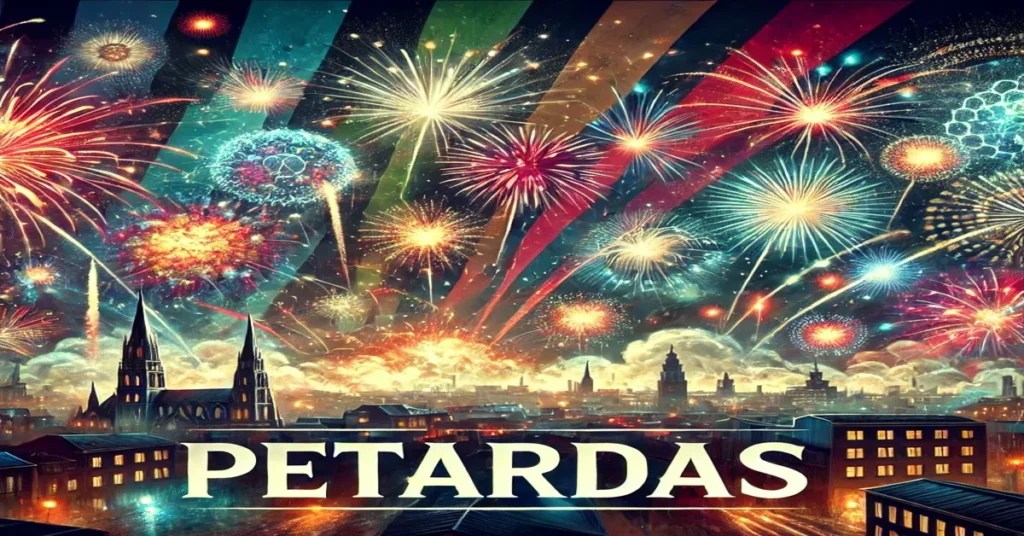Fireworks, or “petardas” as they are commonly referred to in many Spanish-speaking regions, have been a part of human celebrations for centuries. Their colorful explosions and loud bangs are used to mark various occasions, including national holidays, cultural festivals, and personal milestones. Petardas have become an integral part of events ranging from New Year’s Eve celebrations to large-scale public festivals. However, despite their widespread use, fireworks also come with inherent risks and legal implications, which need to be understood by anyone looking to use them safely.
In this article, we will explore the different types of petardas, the cultural significance of fireworks, safety measures to consider, and the legalities surrounding their use in various countries, particularly focusing on Spain, Latin America, the USA, and the UK. We will also address some common concerns and questions people have when dealing with fireworks to help you navigate the do’s and don’ts of using petardas responsibly.
1. What Are Petardas?
Petardas, known as fireworks in English, are explosive devices designed to create a visual or auditory effect when ignited. They can be as small as a snap popper or as large as a professional firework display used in large public events. The term “petardas” is derived from the Spanish word “petardo,” meaning firecracker or small explosive. However, petardas can encompass a broad range of fireworks, from firecrackers to aerial shells that create colorful displays in the sky.
1.1 Types of Petardas
Petardas come in various shapes and sizes, each offering a unique experience. Here are some of the most common types of fireworks:
- Sparklers: Small, hand-held fireworks that emit bright, colorful sparks when lit. Sparklers are typically used during celebrations and are popular with children, although they can still cause burns if not handled properly.
- Firecrackers: These are small explosive devices designed to produce a loud bang. Firecrackers are commonly used during festivals to ward off evil spirits, as is the case in many Asian cultures, or to add excitement to celebrations in Europe and Latin America.
- Roman Candles: Roman candles are fireworks that shoot multiple colored balls of fire into the air. They are often used in conjunction with other fireworks in organized displays.
- Fountains: These are stationary fireworks that emit a spray of colorful sparks. Fountains can last for several minutes and are a popular choice for backyard celebrations.
- Aerial Shells: The fireworks most associated with large public displays are aerial shells, which are launched into the sky before exploding into a burst of colorful lights.
- Rockets: Rockets are a type of firework that launches into the sky, emitting a loud whistle before exploding into a display of lights.
2. The Cultural Significance of Petardas
Fireworks hold a deep cultural significance in many countries around the world, symbolizing celebration, triumph, and even spiritual beliefs. Different regions use petardas for specific celebrations, and the meaning behind them can vary greatly depending on the event.
2.1 Spain and Latin America
In Spain and Latin American countries, petardas are an essential part of many traditional festivals. One of the most famous examples is Las Fallas in Valencia, Spain, where enormous paper-mâché figures are set on fire accompanied by massive firework displays. Petardas are also commonly used during Christmas and New Year’s Eve celebrations, where the loud bangs are thought to bring good luck for the coming year.
In Mexico, fireworks are widely used during religious celebrations such as Día de los Muertos (Day of the Dead) and the Feast of Our Lady of Guadalupe. The fireworks symbolize the joy and excitement of these significant cultural and religious events.
2.2 USA and UK
In the United States, fireworks are synonymous with the Fourth of July, where they are used to commemorate the country’s Independence Day. Fireworks displays are held in nearly every major city, and private citizens often light off smaller fireworks in their backyards.
In the UK, Guy Fawkes Night, also known as Bonfire Night, is celebrated every November 5th with fireworks displays across the country. This night marks the anniversary of the failed Gunpowder Plot of 1605, where fireworks and bonfires are lit in remembrance of the event.
3. Fireworks Safety: What You Need to Know
While petardas are beautiful and exciting, they can be dangerous if not used properly. Every year, thousands of people are injured while using fireworks, and these injuries can range from minor burns to severe trauma. Following safety guidelines is essential to ensure that your celebration does not turn into a disaster.
3.1 General Safety Tips
- Purchase Legal Fireworks: Always buy fireworks from licensed vendors. Illegal or homemade fireworks are more likely to malfunction, leading to accidents.
- Follow Local Laws: Different regions have different regulations regarding fireworks. Make sure you are aware of the rules in your area before using any petardas.
- Designate a Responsible Adult: Fireworks should only be handled by sober, responsible adults. Never allow children to light or handle fireworks.
- Use Outdoors: Always use fireworks outdoors, away from buildings, trees, and other flammable materials. Ensure you have plenty of open space for the fireworks to safely discharge.
- Keep Water Nearby: Have a bucket of water or a hose readily available in case of fire or a malfunctioning firework.
- Wear Protective Gear: Consider wearing safety goggles and gloves when handling fireworks to prevent injuries from sparks or debris.
3.2 Pet Safety
Fireworks can be extremely distressing for pets. Many animals, particularly dogs and cats, are frightened by the loud noises fireworks produce. Here are a few tips to keep your pets safe and calm during fireworks displays:
- Keep Pets Indoors: Ensure that pets are indoors and away from the noise as much as possible.
- Provide a Safe Space: Create a comfortable area for your pet where they can feel safe, such as a quiet room or a crate with blankets.
- Use Calming Products: If your pet is particularly anxious, you can use calming sprays or pheromone diffusers to help them relax.
4. Legalities Surrounding Petardas
Fireworks laws vary significantly from country to country, and even within different regions of the same country. Before using any petardas, it’s crucial to understand the legal landscape to avoid fines or even jail time.
4.1 Fireworks Laws in Spain and Latin America
In Spain, fireworks laws can vary from region to region. For example, in Catalonia, the sale and use of fireworks are tightly controlled, whereas in Valencia, where festivals like Las Fallas take place, fireworks are more readily available. Individuals wishing to use fireworks for personal celebrations should check with local authorities to ensure they comply with regional laws.
In Latin American countries, such as Mexico and Argentina, the use of fireworks is common during cultural and religious festivals. However, it is often illegal to set off fireworks outside of these contexts, and violators may face penalties. Fireworks are typically regulated by the local or federal government.
4.2 Fireworks Laws in the USA
In the United States, fireworks laws vary significantly from state to state. Some states, like California and New York, have strict regulations on the types of fireworks that can be sold and used. In contrast, states like Texas and South Carolina have more lenient laws, allowing a wider variety of fireworks to be sold and used.
The Bureau of Alcohol, Tobacco, Firearms, and Explosives (ATF) regulates large or professional-grade fireworks, which are restricted for use by licensed pyrotechnicians. It’s essential to check the specific laws of your state before purchasing or using fireworks.
4.3 Fireworks Laws in the UK
In the UK, fireworks are heavily regulated, and only certain types of fireworks are allowed for public use. You must be 18 or older to purchase fireworks, and their use is restricted to specific times of the year, including Guy Fawkes Night, New Year’s Eve, Diwali, and Chinese New Year. Outside of these times, you must obtain special permission to set off fireworks.
The UK also has strict laws regarding noise levels, and fireworks that exceed the decibel limit are illegal for public use. Violators can face hefty fines or even imprisonment.
5. Environmental Impact of Petardas
While fireworks bring joy and excitement to celebrations, they also have an environmental impact that needs to be considered. Fireworks release a variety of pollutants into the air, including chemicals that contribute to air pollution and heavy metals that can contaminate soil and water sources.
5.1 Air Pollution
When fireworks are ignited, they release fine particles and gases into the atmosphere. These particles can contribute to poor air quality, especially in densely populated urban areas. In some cases, the pollution levels can be high enough to trigger respiratory issues in sensitive individuals.
5.2 Noise Pollution
The loud bangs and explosions associated with fireworks can contribute to noise pollution, which negatively affects both humans and animals. Prolonged exposure to loud fireworks displays can cause hearing damage in humans and stress in wildlife.
5.3 Alternatives to Traditional Fireworks
For environmentally conscious individuals, there are alternatives to traditional fireworks that provide a similar sense of wonder without the negative environmental effects. Some of these alternatives include:
- Laser Light Shows: Laser light shows use beams of light to create dazzling displays without the need for fireworks. These shows can be just as captivating as fireworks, without the noise or air pollution.
- Silent Fireworks: Silent fireworks are designed to produce vibrant visual displays without the loud noise typically associated with traditional fireworks. These are particularly useful for reducing stress on animals and people who are sensitive to loud sounds.
6. Choosing the Right Fireworks for Your Event
When planning an event that includes petardas, it’s important to choose the right fireworks for the occasion. Consider the size of the event, the location, and the preferences of your audience. If you’re hosting a small backyard gathering, you may want to stick to sparklers and fountains, which provide a gentle, colorful display without the noise of larger fireworks.
For larger events, such as public festivals or celebrations, you may want to hire a professional pyrotechnician to handle the fireworks display. This ensures that the display is both safe and spectacular, providing your audience with a memorable experience.
Conclusion
Petardas, or fireworks, are an integral part of celebrations around the world, symbolizing joy, excitement, and cultural pride. However, with their beauty comes responsibility. Understanding the different types of fireworks, the cultural significance behind them, and the safety precautions necessary for their use is essential for ensuring that your celebration goes off without a hitch. Whether you’re lighting petardas in Spain, the USA, or the UK, be sure to follow local laws, prioritize safety, and consider the environmental impact of your display.
FAQs
1. What are petardas?
Petardas are fireworks or explosive devices designed to create visual or auditory effects, commonly used during celebrations.
2. Are petardas legal in the USA and UK?
Yes, but fireworks laws vary by state in the USA and are heavily regulated in the UK. It’s essential to check local laws before using them.
3. How can I use fireworks safely?
Always purchase fireworks from licensed vendors, follow local laws, use them outdoors, and keep water nearby in case of emergencies.
4. Can I use petardas for personal celebrations in Spain?
Yes, but the laws vary by region in Spain. Some areas have stricter regulations, so it’s important to check with local authorities.
5. What are the environmental concerns with fireworks?
Fireworks contribute to air pollution, noise pollution, and can release harmful chemicals into the environment. Consider alternatives like laser shows or silent fireworks.
6. What should I do if my pet is scared of fireworks?
Keep your pet indoors, create a safe and quiet space for them, and use calming products if necessary to help reduce their anxiety.







